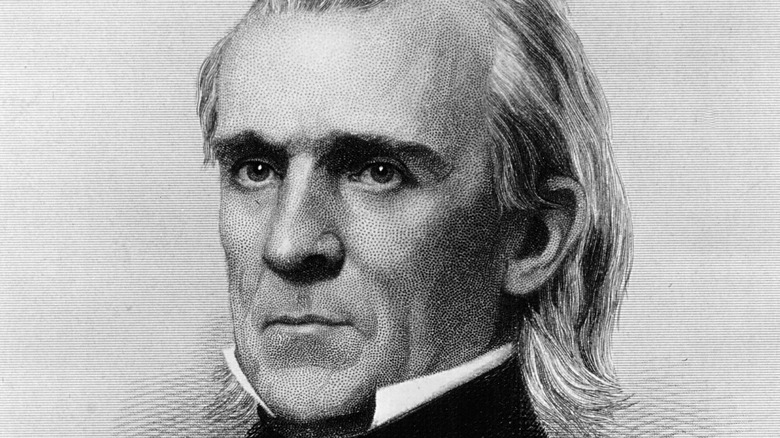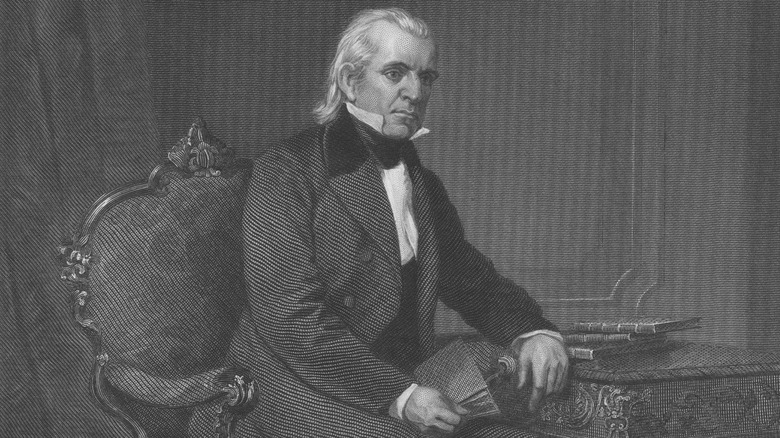Why James Polk's Grave Site Has Moved So Many Times
James K. Polk came into office with a clear agenda. He wanted to bring Texas, California, and Oregon into the United States by treaty or war, lower tariffs, restore the Independent Treasury system, keep the balance between free and slave states, and strengthen the presidency — all in one term. Four years later, he'd achieved each of those ends, though his handling of the slavery issue has been faulted as shortsighted and responsible for much of the unrest throughout America in the 1850s. It was unrest that Polk didn't live to see. Just three months after leaving office, he died on June 15, 1849 of cholera.
But the man who set much of the modern border for the continental United States has not rested easy within its boundaries. In his brief time out of office, Polk had settled into a Nashville, Tennessee estate he named Polk Place, and he was buried in the estate's cemetery for decades. But it wasn't his initial grave. Presidents weren't exempt from precautions against cholera infections, so he was first buried in a mass grave of such victims in the Nashville City Cemetery.
A marker commemorated Polk's presence in that grave until the 1920s, and it was replaced with a new one in 2015. But his remains were in that mass grave less than a year before they were exhumed and the former president was reburied at his home.
Polk has been buried in three places
It was James K. Polk's family who had his remains moved from a mass grave in Nashville to the estate cemetery at Polk Place in accordance with the former president's will. But in 1893, the Polk family lost Polk Place. Following the death of Polk's widow two years earlier, the estate was meant to pass to the state of Tennessee, again according to Polk's will. The will also called for a surviving descendent with the president's surname and suitable character to live at Polk Place as caretaker and curator. But Polk's nephew Tasker led a lawsuit against the estate, complaining that it unfairly bound them by his dead uncle's whim. With no one in the state government prepared to argue the point, Tasker won his case and auctioned off Polk Place for $22,000.
The new owners exhumed Polk again, and his wife for good measure. Their remains were taken to the Tennessee state capitol building, where they were reburied within the grounds. As for Polk Place, it was left to rot, and it was eventually razed to make way for an apartment complex — which was ultimately torn down as well. The estate's remains were brought to the Polk Presidential Hall in Maury County.
Will his remains move again?
For over a century, it seemed that the grounds of the Tennessee state capitol would be James K. Polk's final resting place. But in March 2017, The Tennessean reported on a development within the capitol's halls: Someone had proposed relocating the former president yet again, this time to the President James K. Polk Home and Museum in Columbia, Tennessee. Introduced by state senator Joey Hensley, the proposal had the support of the museum's curator, Tom Price. "One of the questions we would get is 'Well, where is he buried?'" Price told The Tennessean. And Hensley complained to the Associated Press (via the Portland Press Herald) that it was a disservice to Polk to leave him in the capitol, where his grave was in such an isolated spot. Hensley claimed he hadn't even known about it for 14 years of his of service in the legislature.
Some of Polk's descendants told Hensley and other supportive lawmakers that they backed the move. But others were against it, and publicly so. Teresa Elam, Polk's niece seven generations removed, likened the proposed relocation to grave robbery and insinuated that it was a ploy to snag tourist dollars for the museum and Columbia (per CBS News). Several historical societies also objected. Initial arguments began in 2018, and the resolution was eventually approved. But legal complications stood in the way of a quick move, and as of 2022, Polk's grave was still in the capitol (per U.S. Army).


